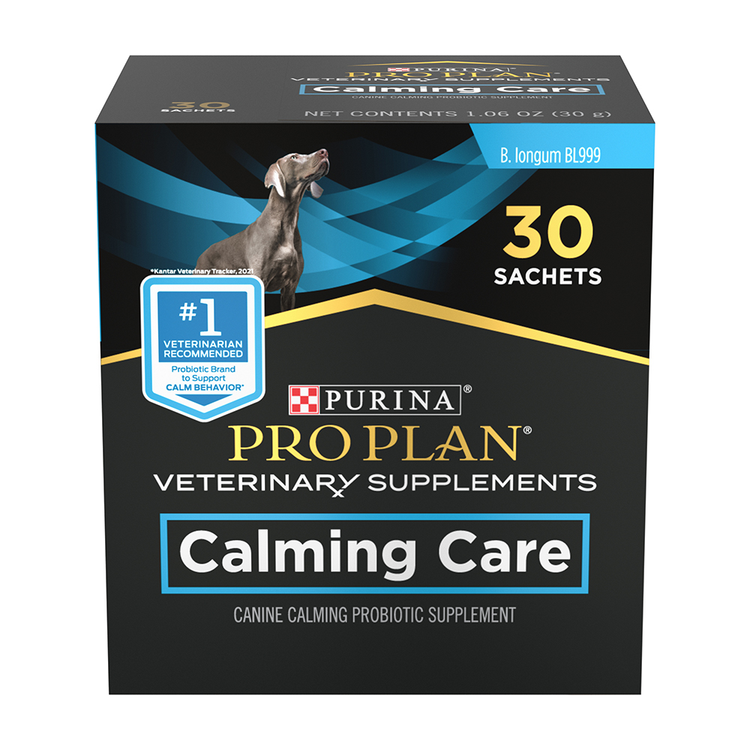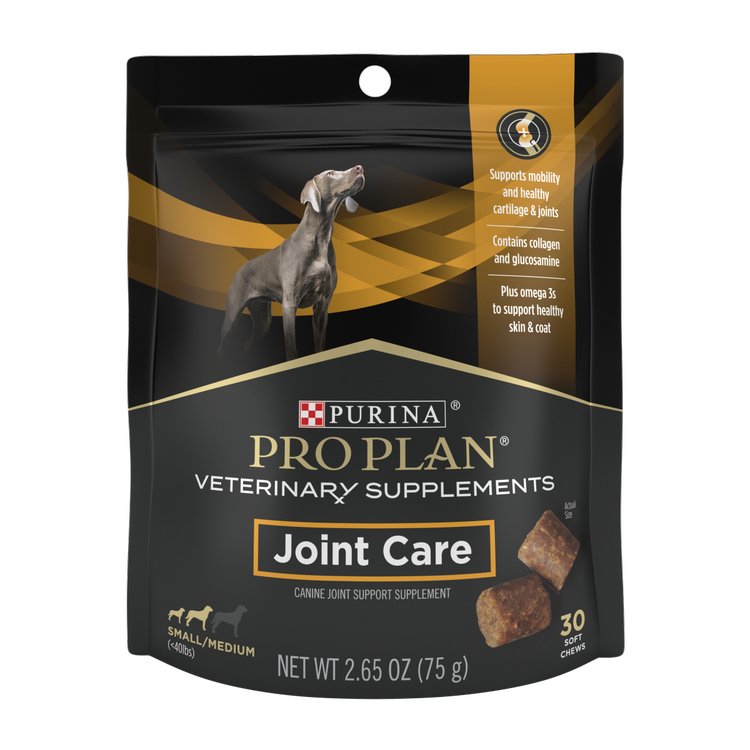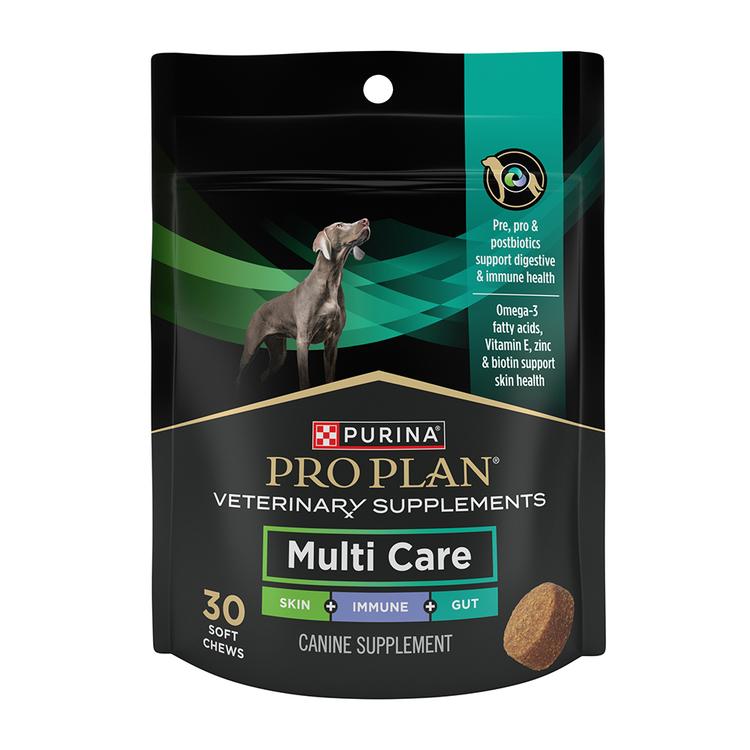Dog Vitamins & Supplements: What Do Dogs Need?


For most dogs eating a complete and balanced diet, additional vitamin and mineral supplements are not necessary. But there are times when supplements can benefit dogs with certain health concerns and support a dog’s overall well-being.
If you think your dog has extra nutritional needs, make sure to talk to your veterinarian, who can help you decide the best dog supplements for your dog’s specific health concerns.
What Are Nutritional Supplements for Dogs?
Nutritional supplements for dogs generally contain vitamins, minerals, and other nutrients that are blended in the proper proportion to support a unique health need.
Dog supplements come in a variety of forms, including powders, chewable tablets, liquids, or soft chews. In addition to active ingredients, they also contain inactive ingredients that are included to improve palatability or maintain the viability of the supplement’s form. For example, inactive ingredients may add flavor, or they may keep powdered supplements dry and free-flowing.
What is the difference between vitamins and supplements? Individual vitamins and minerals are a single source of a nutrient. Multivitamin/multimineral supplement formulas commonly contain multiple vitamins, dietary minerals, and other nutrients in dosages that are recommended based on a minimum daily requirement.
Vitamin A for dogs will contain only vitamin A, whereas a multivitamin will contain vitamin A plus others, such as B vitamins for dogs, vitamin E, and minerals like calcium and zinc.
When you are considering supplements or single-source minerals and vitamins for dogs, make sure they have passed quality control standards established by the National Animal Supplement Council, or NASC.
Can dogs take human vitamins? While dogs and humans may share a need for certain similar vitamins, the recommended dosage may not be the same. Check with your vet before giving your dog vitamins and minerals, or supplements made for human consumption.
Vitamins/Minerals | Supplements | Both |
|---|---|---|
Individual vitamins and minerals are a nutrient from a single source | Supplements contain a mix of vitamins, minerals, and other nutrients | Both are available in a variety of forms, such as tablets, powders, and liquids |
Vitamins and minerals are included among the active ingredients in supplements | The active ingredients in supplements are blended to support a unique health need | Both must pass efficacy and quality control standards, such as the NASC |
What Vitamin and Mineral Supplements Do Dogs Need?
What vitamins and minerals do dogs need? Dogs need 12 essential vitamins and 11 essential minerals to thrive, and each one fulfills a specific need. High-quality dog foods are formulated to provide all the essential vitamins and minerals, in the correct proportions, to meet the nutritional needs of most dogs. But in certain cases, supplementation may be beneficial.
A dog’s need for supplements can change with age. Puppies have different nutritional needs than adult dogs, and senior dogs may need joint, immune, or cognitive health supplements in their golden years.
A common question among dog owners is, What supplements should I give my dog? Talk to your vet about the conditions unique to your dog that could be helped with supplements. If your dog has a specific nutritional need – such as cognitive support, weight management, joint health, or sensitive skin – talk to your vet about what dog food or veterinary formula is best for your dog. These foods have been created with the dog vitamins, minerals, and nutrients that will help you and your vet manage your dog’s condition.
As dogs age, there is a drop in brain glucose metabolism, which may result in your dog experiencing memory loss, reduced social interaction, learning impairment, and disorientation. Daily supplements for dogs with brain-protecting nutrients can support cognitive function and contribute to brain health.
Dogs that have been taking antibiotics may benefit from probiotic supplements for dogs. In addition to getting rid of a bacterial infection, antibiotics can also wipe out the good bacteria in your dog’s gut that support his digestive and immune health. Supplementing with probiotics, like FortiFlora for dogs, can help restore the microbiome balance.
Be aware that if your dog is eating a nutritionally balanced diet, excess supplements can mean wasted vitamins, or worse, vitamin toxicity. For example, too much vitamin D for dogs can be dangerous and lead to vomiting and severe illness that requires emergency care. To make the best decision about your unique health needs, discuss your dog’s diet and need for supplements with your vet.
What Supplements Should You Give Your Dog?
If you notice signs of certain health conditions, discuss those symptoms with your vet to determine the best course of action and what supplements are best for dogs with your pup’s condition.
What supplements do dogs need? Because supplements address a specific health need, learn more about the signs of those conditions to see if your dog would benefit from a supplement. A few examples include:
- Senior dogs that appear arthritic and have difficulty jumping or getting up from a reclined position
- Dogs of all ages may show nervousness or anxious behaviors
- Dogs with dry, flaky, or itchy skin
- Senior dogs that seem forgetful or disoriented
- Dogs that experience occasional diarrhea due to diet changes or environmental stress
- Older dogs often develop weakened immunity
- Dogs that have been diagnosed with heart disease
Types of Supplements for Dogs
There are several good supplements for dogs that can help support their health needs.
Joint Health for Dogs
Arthritis and joint health supplements are often associated with senior dogs, but your veterinarian may suggest starting your dog on them sooner, especially if your dog is a breed with a predisposition for joint issues. To support your dog’s mobility and joint health, joint supplements for dogs may be a smart addition to his diet.
Ask your vet about Pro Plan Veterinary Supplements for Joint Care to support mobility and normal daily activity. They contain collagen, glucosamine, and chondroitin for dogs, as well as omega-3 fatty acids to support a normal inflammatory response in joints from natural aging.
Dogs with Anxious Behaviors
Dogs with stress from separation anxiety, and those exhibiting nervousness, hyperactivity, or anxious behaviors on a daily basis may benefit from the calming properties of Purina Pro Plan calming supplements for dogs.
Because a dog’s gut is connected to his mind, veterinary care dog calming supplements with the specific probiotic BL999 can also help dogs maintain calm behavior and cope with external stressors such as separation, unfamiliar visitors, or changes to their routine.
Dogs with Skin and Coat Issues
If your dog’s skin and coat appear healthy, that’s often a good indication that your dog’s overall health is in good shape. Aside from regular grooming, skin and coat supplements that feature ingredients like vitamin E, omega-3 fatty acids, coconut oil, and minerals are a natural antioxidant blend of nutrients to support healthy skin.
Brain Health for Dogs
Helping your dog stay sharp into old age is important. Besides keeping him active and mentally stimulated with exercise and interactive dog toys, dog brain health supplements are good choices for dogs. Look for brain-boosting ingredients like medium-chain triglycerides from coconut oil and omega-3 fatty acids from marine fish sources, as well as vitamins and antioxidants in tart cherries, turmeric root, and astaxanthin when choosing supplements to support cognition.
Dog’s Digestive Health
The more we learn about the digestive system, the more we realize its importance for not only healthy digestion, but immune health as well. Your dog’s intestinal tract is filled with beneficial bacteria, yeast and other microorganisms, called the microbiome. Dog supplements with probiotics, like FortiFlora for dogs, promote healthy digestion by adding good bacteria to your dog’s gut. Digestion supplements with prebiotics, like pumpkin and psyllium, feed good bacteria, help your dog’s body break down food, and support immune system function.
Heart Health for Dogs
You can keep your dog’s heart in tip-top shape with plenty of exercise, but adding a heart health supplement for dogs can also be beneficial. These supplements contain green-lipped mussels, which are rich in taurine and vitamin E to support your dog’s heart health.
Dental Supplements for Dogs
Just like us, a dog’s overall health isn’t complete without something to keep their teeth and gums clean from tartar and plaque buildup. Dog dental chews come in all shapes and sizes, often with a ridged design to help scrape teeth clean, and contain natural ingredients to help support tooth and gum health.
Remember, if your dog is struggling with any of these issues, your veterinarian should be the one to assess whether supplementation is an appropriate choice, or if other options would be more beneficial.
For more expert tips for the health of your dog, explore our other dog health articles.
Related articles

Find Your Pet’s Perfect Food
Get your personalized recommendation with our Pet Food Finder tool.






